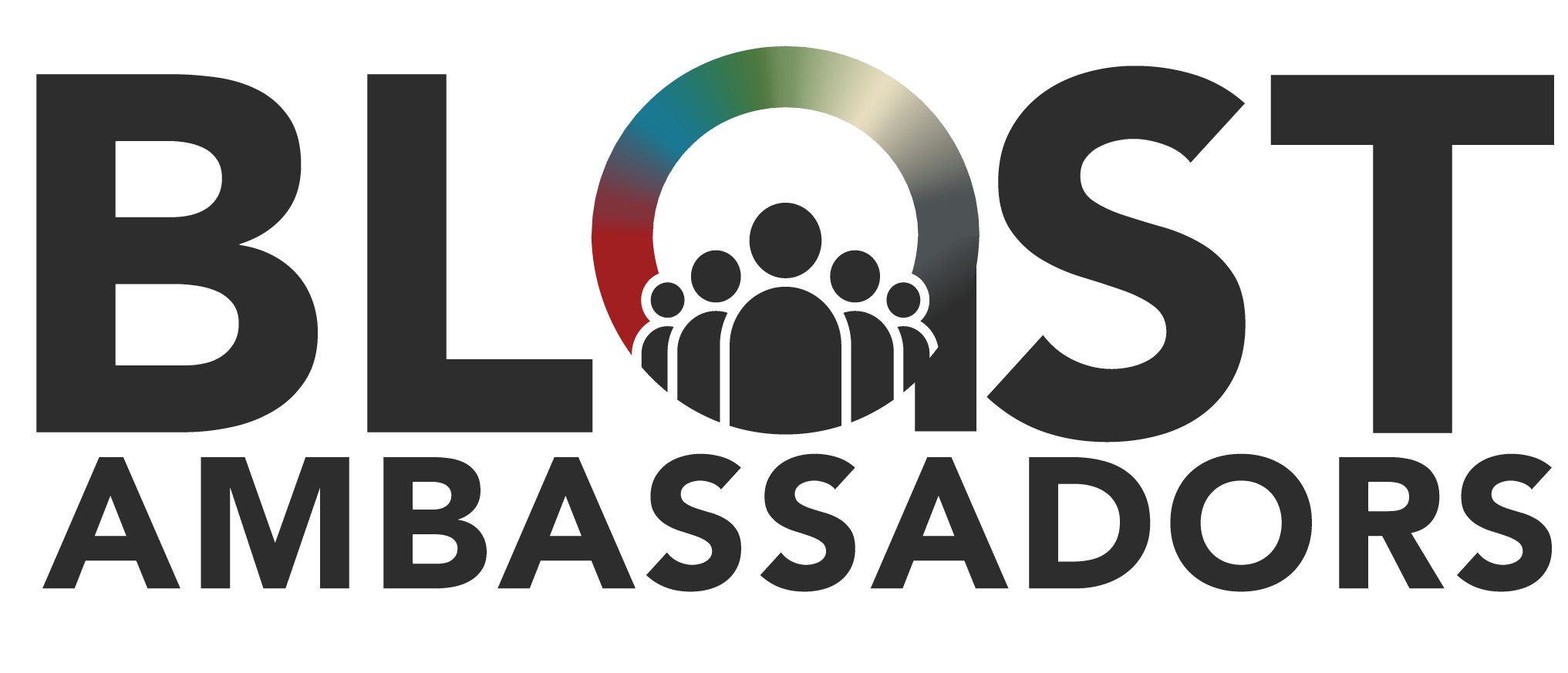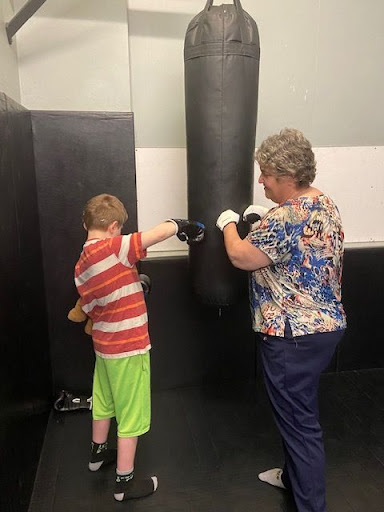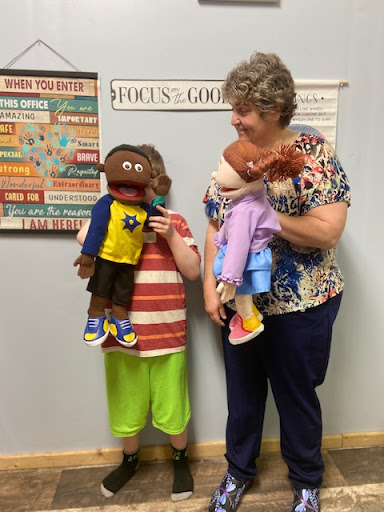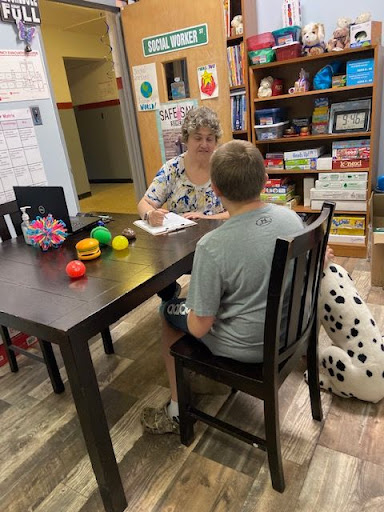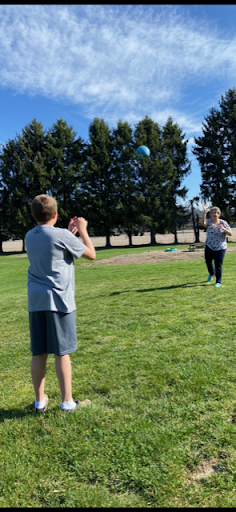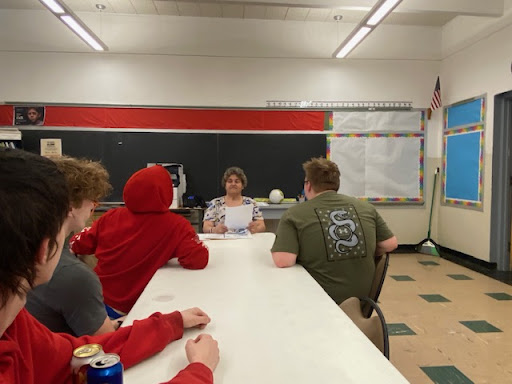April Seeley
A Snapshot into the Life of a Social Worker
Practicing coping skills
Sometimes all you need is a little help from a friend to express your emotions!
Therapy does not always have to be done sitting in the classroom or an office.
Part of my day always involves group therapy where I bring together students to discuss a number of topics that they deal with in their daily lives and help promote healthy coping strategies.
A Day in the Life of a Social Worker
Are you looking for a high-energy, fast-paced, never-dull career that allows you to think outside the box and make a difference in a child’s life? Have you ever considered being a school social worker? Being a school social worker can be a gratifying job and career. My name is April Seeley, and I am the Social Worker for the Emotional Support Program at the BLaST North Academy. I have been a social worker for over thirty years. My last nine years have been spent as a school social worker. I am a Licensed Social Worker in PA with a Bachelor’s Degree and Masters’s Degree in Social Work.
When I say that no two days are the same in school social work, I am not joking. Building a trusting relationship with students is an essential part of my job. I start each day by greeting all students as they arrive. You would be surprised how much information can be gathered about each student in that short amount of time. For example, I often find out information about my students that may be helpful when providing interventions later in the day. After greeting students, most mornings start with talking to a student or two regarding an issue that may have happened the previous day. Sometimes, I will use the time to do individual counseling sessions with students. Most students receive social work services as a related service through their Individual Education Plans (IEP), and I must see students for a certain number of minutes each month for individual services. Even if a student doesn’t have Individual Social Work Services in their IEP, I try to have an individual session with all students each month.
When not doing individual counseling, I provide behavioral support in the classroom. Often it helps to have an extra set of eyes to determine motivation and interventions for positive student behavior.
A favorite part of my day is the daily group time. I run a social/emotional group with students on various topics, from depression to advocating for yourself. In addition to the serious topics, I like working with the students on the importance of coping skills, self-care, and building positive relationships. Then, in the last fifteen minutes of group, we often throw a football, play games, or talk. Recently, a student made a long-lasting comment which almost brought me to tears. The statement reinforced why our daily groups are so important. The student said, “Seeley, I can’t believe I’m saying this, but our group is kind of like a family.” We support each other, we argue with each other, and we have fun.
You will likely find me in meetings if I’m not in the classroom or doing therapy. I attend all IEP meetings, 45-day review sessions, and meetings with service providers. In addition, I often work with caseworkers, probation officers, outpatient therapists, and community providers to make needed referrals for students. Did I mention that my job requires me to meet with the psychiatrist twice weekly? Something unique about the Academy is that we provide psychiatric services for students. I am lucky enough to work closely with our psychiatrist and participate in psychiatric evaluations and medication checks for my students.
Paperwork, paperwork, and more paperwork!!!! Documentation is an essential part of my job. Keeping extremely accurate documentation has allowed me to advocate for needed student services.
I have a dream job and LOVE my career as a K-12 Social Worker at the BLaST Academy. I get to work with teachers and professionals to create a safe learning environment where students can succeed. My students are why I love what I do! My students are continually educating me.
Get to Know Our Ambassador
Transcript
Welcome to BLaST the Air Waves with BLaST Intermediate Unit 17 here at BLaST Intermediate Unit 17. We strive to transform lives and communities through educational services. On this podcast, we will provide you with educational solutions for all, no matter the learning environment. So teachers, administrators, caregivers, what are you waiting for? What would happen if we started questioning “What if”? What if we had a positive perspective on education? What if we flipped the switch on education? What if we were the solution?
Today we have the pleasure of speaking with April Seely,, one of our BLaST Ambassadors here at BLaST Intermediate Unit 17. Within our organization, April serves as one of our social workers. So April, thank you for joining us today to discuss your role with the organization and your experiences throughout our newly started and newly formed ambassador program. Are you ready to blast the airwaves with us?”
“I am. Thanks for having me.”
“So April, why don’t we start by telling us a little bit more about yourself and also your role within the organization here.”
“ Well, I have been a social worker for over 30 years. I was in public child welfare for 22 years and I have been with the BLaST Organization for nine years now. This is my ninth school year and I love every day of it.”
“Wow. Ninth school year, 30 years in social work. That is a long time. We’re so fortunate to have you here with us. We’ve spent a lot of time in our ambassador program discussing the intermediate unit as a system and how our system really impacts and collaborates with other systems locally, regionally, statewide. I know we had our, you know, blocks out and we were checking everything and, and having you guys retell us, like how does an IU work? So we are, as we’ve discovered, very unique in our own ways. Can you share with our listeners why you chose an Intermediate Unit? You mentioned how you didn’t start at an Intermediate Unit and then you ended up coming. Why did you choose this Intermediate Unit “life” or what do you enjoy working about most at the Intermediate Unit?”
“Well, I’ll be honest, when I started out, I had absolutely no idea about the difference between an Intermediate Unit and a school district. There was a posting for a social work position, and I had always dreamed of being a school social worker and I truly do have a dream job. But now after being with the Intermediate Unit for nine years I really, really enjoy being part of the Intermediate Unit because there are so many different facets of our organization and different, people that I can rely on and outreach with just within our own organization to be able to provide my students the best services possible. You never know what a student might need. I know the social services aspect of it, but then, obviously being a school social worker, the educational piece has really become a big part of my life as well, and I love that working within our organization, I can reach out to a number of different people for resources for my students.”
“Yeah, it is quite the network here at the organization that I would agree with you. Before I came to the Intermediate Unit, I had no idea half, over half, the things that we did here. So, and every IU across the state is unique in that way. So, thank you! So now that we’ve established sort of your “why” is an Intermediate Unit, you speak very highly of social work and saying how you’ve always wanted to be a social worker and you knew it was in your heart. Why did you choose this specialty area? And, you know, as I, I learned from you through this ambassador, it’s not the easiest position, right? It takes a special person for social work, but it’s one of the most rewarding positions. What advice also maybe might you give to someone that’s looking to go into social work?”
“Well I wanted to be a social worker all my life. I think I was around 13 years old when I saw an old gentleman being treated rather sternly by somebody at the grocery store and he didn’t have enough money to pay for his food, so I always thought I wanted to help people. But what I’ve found through social work is that it isn’t feeling sorry for somebody. It is about helping to empower them, giving them the resources and the knowledge of how to overcome whatever their challenge is. It definitely is sometimes a job that presents many challenges. You know, a school day is typically 8:00 a.m. to 3:00 p.m. there, or 8:00 a.m. to 3:30 p.m., and there are some days that I have to work longer than that and definitely when I was in the child welfare system it was definitely a challenge as far as the hours and stuff, but, you know, a lot of people will say to you, “oh, that’s such a thankless job”, and it isn’t. I get every day, especially now that I truly am, I feel in my dream job, I learn every day from my students. I learn every day from the people that I work with here and the families. And my advice to anybody that’s looking into social work is there’s so many different facets of it. I have landed, obviously, like I said my dream job of working in a school and where I’m at at the BLaST Academy is a little different. I think it allows me to even be more creative and that, and to think outside the box. So if you’re that type of thinker that, you know, you want different opportunities in that social work is definitely the field that could be for you.”
“Yeah. And April, we’re going to go a little bit, you know, off script here. I’m not trying to throw you off or anything, but you mentioned about, you know, it could be it’s, yeah, 8:00 to 3 30, 8 to three, but sometimes it goes beyond that. So how do you take care of yourself? How do you try to stay balanced, and persevere and be resilient? As a social worker, what do you find?”
“Self-care is huge. Self-care is absolutely huge because even if it is, you know, even if my day isn’t with the normal bounds of the work hours, the issues that you’re dealing with can traumatize you. Sometimes they call it vicarious traumatization but it is important for anybody to have a self-care routine. For me, I like my, you know, massages I get and that, and I like spending time outside with my family. I like to snowmobile in the winter. I like to ride four wheeler in the summer. So it’s just having those things and of course, having people that you can rely on. Obviously due to the confidential nature of the job, it’s not that you can talk about, you know, what’s going on with our students or using names or anything, but just having to somebody to say, you know what, I’ve had a really rough day and I could just really use somebody to sit with me. Luckily I have those people in my life, but I can’t stress self care enough.”
“Yeah, absolutely. And we’ll be talking a little bit more about the self-care, a little bit, some of your fun things at the very last question, but, so I appreciate that. I think that’s really great advice. And you mentioned, you know, throughout the program, you know, we have BLaST academies and you’re working at one of our academies, but we’ve embedded this job shadowing experience in our ambassador because our Intermediate Unit is so large. And so through that experience, I believe one of the experiences you got to do was go to a district and and shadow social worker in a school district setting, which we also help contract for and then you had another placement I’ll let you share about, but can you share with our listeners who you shadowed, not necessarily the person, but what you shadowed and then what you noticed or learned throughout that experience.”
“Yes. I shadowed a social worker that is employed by BLaST but is contracted with a district. So that’s a little different than my position because, you know, I report directly to people that are with BLaST. She reports both the BLaST and to the district that she works for. So she has, you know, basically two sets of policies and regulations and all of that that she’s following. She is also what I would consider itinerant. A lot of the people that work for BLaST are working in more than one location. While she works for one district, she goes between different buildings. So I found that really interesting because, you know, I said what happens if you’re at one building and there’s a crisis in another? So the way they handle that would be like different than being here in one building. So it was very interesting.”
“And then you also had another job shadow experience too, correct? At an E.I. clinic in Early Intervention Clinic?”
“Yes. That was an amazing, amazing experience. I had happened to know the teacher that was part of the E.I. Clinic, and I’ve heard about these E.I. clinics, but I had never been to see one. Just from a social worker perspective they didn’t have a social worker as part of the EI clinic, but just watching the interactions of the staff,I was able to view two evaluations, to see if students needed service or if children needed services. And that was also different for me because they were below school age, I work with the school age population. So this was another service that BLaST offers to children before they’re even in school, but just the amazing way that the people that were there interacted BLaST employees and you know, in their care of not only the student, but of the family, obviously sometimes in an evaluation setting you know you don’t know what the outcome is going to be of a diagnosis that may be given or that, and the staff was just so impressive. It was so obvious they had worked together for a long time because it was just such a seamless thing. But also just the way they interacted with the student and the parent, I was just so impressed. And then to see what services they were going to be able to hook the families up with was really exciting because, you know, sometimes if you’re not in a service organization or something like that, a lot of times you don’t know what services are out there. So it was really exciting to see that the families had some hope then for things that could be there for their children. “
Yeah, and I find, like when I’m talking in the community, sometimes early intervention is a service that many community members aren’t aware of or family members, and it’s one of those things, it’s like a hidden gem because it’s here to support and we do ,I use across the state, do a great job connecting communities and families. So I do think I’m glad you had that opportunity to shadow with early intervention.”
“ Well, and the other thing too is the early intervention clinic that I got to go to was in Tioga County.
Mm-hmm. Um, much of the area that blast serves, the four counties that we serve is rural. Right. And so I know, um, you know, as a social worker, transportation in this area is super hard sometimes. So it was so great to see that the families could come to one location and all of these providers, like, uh, you know, a psychologist, uh, the teacher, the physical therapist, um, everybody that was doing the evaluation was right there in one spot for the family.
Hmm. That is powerful. That’s, that’s great. So each year with our ambassador program, you know, this is our first year, you guys were the first cohort, but we are looking to, to, you know, open up for the second cohort next year. Can you share with our new class of ambassadors, your biggest takeaway from the program, um, that maybe someone could take and maybe if they’re wondering, do I wanna do this program or not?
What is your biggest takeaway? Um, well, just the networking obviously with, um, networking within our own organization, um, and just seeing the amazing people that Blast has employed by them and just getting new knowledge and new information, um, again, that inevitably can help our students. Um, you know, and that, um, right here within our own organization.
Yeah, I mean, we. Really, the only time we’re all together is in service, right? So two days at the beginning of the year and then we’re all spread over four counties. So it, it is a really great experience, even for myself as a facilitator to, to learn from all of you as well. So it’s time for my favorite part, what I said.
We’ll get back to and every season. Our listeners know this is the last question usually, um, some of that self-care. Let’s get to know you beyond, uh, social worker, April Sealy. I’m gonna ask you five fast facts, five fast questions about you, and if you could answer those in a, you know, let us know about you a little bit more.
We’d appreciate it. All right, so you ready to go? I’m ready. All right. So what is your favorite genre of music? Um, I love any music. I love any music that tells a story, but I am an eighties girl. Any in eighties hair band, eighties rock, eighties love ballads. So, uh, skid row, anything you wear the eighties headband too?
Yes. All right. Absolutely. What about your favorite read genre or author? This is gonna sound terrible for somebody that is working it in a school system, but I’m not really a. Like reading except for stuff that’s for work. So I don’t have like a, a favorite, uh, outside of work. Reading does not do it for me for self-care.
Do you do anything? Do you like to, what about your professional reads? Because I do this, oh, my pro, my professional reads like, I cannot stop. I get on a subject and I’m willing to read anybody. So it’s not that I have one favorite author, but like, gimme a subject, whether it be, you know, in my business, suicide or ideations or you know, um, how to support a family and solution focused.
I love reading anything. Awesome. What about your favorite TV series show, Netflix series. Well, again, here I, here I go with the old I, I’m one of the oldest people that works in my building and uh, it’s the soap opera, the Young and the Restless. Oh. I had been watching the Young and the Restless since I was a kid and in college I would make my schedule around so I could watch it and now I still watch it.
I love summers. That’s fantastic. Uh, what about your favorite food or restaurant? Um, my favorite food is always a, a good burger. Um, unfortunately the, the restaurant that always a good blue cheese burger. But right now if you’re in Canton, go to the park cuz they have a good, a good blue cheese burger. Oh yes, yes.
That was that in my other hidden gem that I found. I really love the park too. That’s a good one. Okay. And last one, what is your favorite motto or quote that you like to live by? All right. Well, Dr. Seuss, he, he’s taught us a lot. So unless someone like you cares a whole awful lot, nothing is going to get better.
It’s not. That’s a good one. Which one is that one from? Is it just one of his quotes, right from a Lorax? Nope, it’s from the Lorax. So fun. I like it. Well, we cannot thank you enough for your time today, April. We know, and I’m assuming, but I know our listeners enjoyed, uh, le learning from you as well and sharing about social work and your role here in the ambassador program.
I’m sure they might wanna connect with you further. And so in order to do that, I’m gonna encourage our listeners to learn more about social work in April and her role at the IU and as an ambassador at our webpage, www.iuseventeen.org, under our ambassador page. And April will have her own page as well.
So this has been a blast. April, again, thank you for taking some time today to blast the airwaves with us and our listeners. It was a pleasure having you on the podcast and take care. I’m sure I will see you very soon and thank you again. Have a great day. Thanks.
We would like to thank you for blasting the airwaves with us today. If you like the show, please subscribe or leave a review. If you want to know more, check out www.iuseventeen.org for further resources and show notes. As always, we want to thank you for what you do every single day. Remember, keep shining.
We’ll be back next episode to provide you another educational solution for all as we continue to transform lives and communities through educational services.

